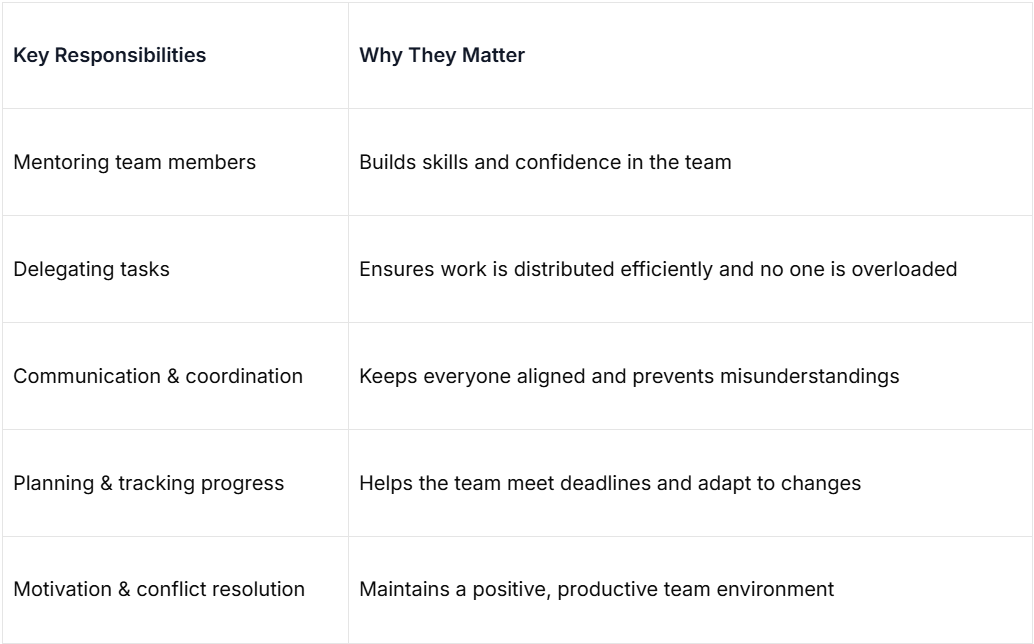Team Lead Responsibilities: Key Duties for Effective Leadership

Imagine you're the captain of a small ship navigating through calm seas and sudden storms – that's what being a team lead often feels like. You're responsible for steering your team toward success and keeping everyone on course. But what exactly are the core team lead responsibilities that keep everything running smoothly?
Guiding and Mentoring Team Members
One of the most important duties of a team lead is acting like a coach for your team. You guide team members by sharing knowledge, giving feedback, and helping them solve problems. If a junior colleague is stuck on a task, you might jump in and turn the challenge into a learning opportunity. Using Qooper mentoring software can enhance this coaching process by connecting team members with mentors, tracking progress, and providing structured guidance for skill development.
Mentoring also means recognizing each person's strengths and weaknesses and helping them grow. A good team lead assigns tasks that play to each member’s strengths while also stretching their abilities. Regular one-on-one meetings help you build trust and confidence in the team.
Delegating Tasks and Managing Workflow
No captain can steer a ship alone, and no team lead can handle all the work. Effective delegation is key to managing the team’s workflow. This means breaking a project into smaller tasks and assigning each task to the right person. By distributing work thoughtfully, you prevent overload and ensure everyone contributes.
To delegate effectively, keep these best practices in mind:
Know your team’s strengths: Assign tasks to the people who can do them best.
Set clear expectations: Make sure everyone knows what to do and when it’s due.
Trust your team: Avoid micromanaging and give people ownership of their work.
After delegating, you monitor progress and step in to help or adjust tasks if needed. It’s like conducting an orchestra – if one section falls behind, you adjust the tempo to keep the team in harmony. Clear delegation and attentive follow-up ensure that projects move forward smoothly and finish on time.
Communication and Team Coordination
Communication is the glue that holds a team together. As a team lead, you’re the main link between your team and the rest of the organization. This means having regular check-ins or team meetings to keep everyone up to date. In these discussions, you ensure information flows clearly and misunderstandings are minimized.
Good communication isn’t just about talking – it’s also about listening. You communicate with upper management and other teams, translating big goals into actionable tasks for your team. At the same time, you listen to your team’s feedback and concerns. By encouraging open dialogue, you can address problems early and make sure everyone feels heard. This steady two-way communication keeps the team coordinated and working as a united front.
Project Planning and Progress Tracking
Think of a team lead as a navigator plotting the course for a voyage. Project planning is about breaking down a big goal into a roadmap of tasks and milestones. You work with the team to set realistic deadlines and clarify who is responsible for what. A solid plan gives everyone a clear direction. Utilizing consulting project management software can enhance your team's ability.
Once the project is underway, you must track progress and be ready to adapt. Plans can change if obstacles emerge, so you adjust course when needed. Many team leads use software tools (for example, alloysoftware.com) to monitor tasks and deadlines. By keeping an eye on progress and quality and making timely adjustments, you ensure the team delivers successful results.
Motivating the Team and Resolving Conflicts
A team lead’s role isn’t only about tasks – it’s also about the people performing those tasks. Motivating your team is crucial for maintaining a positive work environment. Small gestures have a big impact – praising good work or celebrating milestones can boost morale. When you lead with positivity, your energy is contagious and keeps the team motivated even during tough times.
Conflicts and challenges are bound to happen, and it’s your job to step in calmly and fairly when they do. Start by listening to each side so everyone feels heard. Then guide them to a fair solution or compromise that gets the team back on track. By addressing issues promptly, you keep the atmosphere healthy and collaborative. Ultimately, taking care of your people is one of the most important parts of being a team lead.
Below is a quick recap of the team lead’s key responsibilities and why each one matters:

Conclusion
Being a team lead is a challenging yet rewarding journey. You wear many hats – coach, communicator, planner, problem-solver – and learn something new every day. By mastering these responsibilities and continuously improving, you set your team up for success. Not only will projects run smoother, but your team members will thrive under your guidance. Are you ready to take the helm and lead your team to success?





